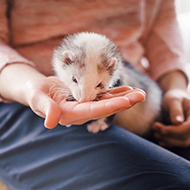Scottish SPCA appeals to public after ferret influx

The charity has far more ferrets seeking homes after an unexplained increase in those needing care.
The Scottish Society for Prevention of Cruelty to Animals (Scottish SPCA) is appealing to the public to not overlook ferrets for adoption as the charity experiences an influx of the pets arriving at its shelters.
Over 60 ferrets are currently being cared for by the Scottish SPCA, with all nine of they charities rescue and rehoming centres caring for a larger amount of ferrets than usual.
Graeme Innes, Scottish SPCA deputy head of field operations, commented on the recent influx of ferrets: “Sadly, these animals are consistently overlooked for rehoming and tend to stay in our care for a long time. It’s a shame as they can make fantastic pets in the right homes.
“We’re not sure what’s driving the increase in ferrets coming in to our care. It could be that people didn’t want them any more when the reality of owning one of these animals set in!
“Although they are great for adult homes, or homes with older teenagers, they’re not really suitable as children’s pets as they can nip.
“They also need a lot of enrichment and exercise as they’re highly social, intelligent creatures who love interacting with their owners. They shouldn’t just be left in a cage and forgotten about.”
Graeme encouraged the public to consider owning ferrets, highlighting their clever and sassy personalities: “However, if you’re willing to put the time and effort in to caring for them they can be incredibly rewarding animals to own.
“They’re very inquisitive and cheeky and will definitely bring a lot of fun in to their new owners’ lives!”
Anyone interested in rehoming any of the ferrets being cared for by the Scottish SPCA can find out further information, view and apply for rehoming on the charity's website here.
“If anyone is looking for a friend for their existing ferrets, we’d love to hear from you as we have so many in our care that we’re sure we can find the perfect match,” Graeme added.
“If anyone is also thinking about becoming a first-time ferret owner then please consider adopting an animal and giving them a second chance.
“Our centre receptions are open 1pm until 4pm daily and you can give our teams a call or pop in with any questions you might have about adopting one of these animals.
“We’d love to see these overlooked animals start to generate some interest and get the loving forever homes they deserve.”



 The Veterinary Medicines Directorate (VMD) is inviting applications from veterinary students to attend a one-week extramural studies (EMS) placement in July 2026.
The Veterinary Medicines Directorate (VMD) is inviting applications from veterinary students to attend a one-week extramural studies (EMS) placement in July 2026.